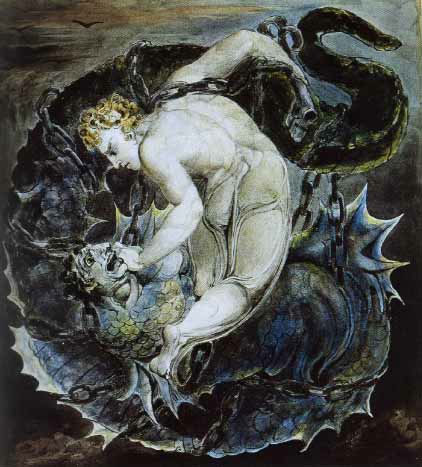Parameters of Cleansing

Bow ties are cool. Fezzes are cool. But systematic typology is very cool. Try this on…

Bow ties are cool. Fezzes are cool. But systematic typology is very cool. Try this on…

“No one can enter a strong man’s house and plunder his goods, unless he first binds the strong man. And then he will plunder his house.” (Mark 3:27 27)
A lot of commentary on the Revelation seems oblivious to the allusions to the Pentateuch (although there are many that do take it into account and are enlightening at the most obvious points). Even the “binding” of Satan in Revelation has an Old Testament background.
“But your dad will not
know about that,”
Said the cat.
“He will never find out,”
Laughed the Cat in the Hat.
A popular argument among theistic evolutionists and hyperpreterists (and theistic evolutionary hyperpreterists) is that Adam wasn’t the first actual man, just the first man “in Covenant” with God. [1]
Micah Martin (brother of one of the authors of Beyond Creation Science), has kindly read Bible Matrix II and written about my adherence to the Genesis account of Creation as both Covenant and history (i.e. the account is not simply an account of the physical world being given a Covenantal purpose as a Temple, but also its actual Creation). There is much that we agree on, but the disagreement on this subject couldn’t be sharper, or of more importance.
One of the hyperpreterist/full preterist [1] gents made a keen observation after reading my article Covenant is the Key: Moses vs. Hyperpreterism. My argument was that since the Revelation follows the Covenant structure laid down in the Torah (and echoed throughout the Bible), we should expect the final section of the book to concern the future, otherwise known as Continuity or Succession.
The counterargument was that this section did concern the future when John wrote the book, but that we are living beyond that future now, and there is no final event or consummation. The only consummation was AD70.
This is a really good argument, but it does two things. Firstly, it makes nonsense of their own argument that Revelation 20 is another viewpoint of the events surrounding the end of Judaism in AD70. Also, it fails to take into account the structure and contents of Revelation 20 itself.
There is great advantage in tracking the shape of God’s work in history through the Old Testament. This is because God is consistent. Everything He does has the same shape, even though He does it in new and surprising (and sometimes devastating) ways.
One of the big handles in Scripture is the five-fold Covenant pattern, described by Ray Sutton in his book, “That You May Prosper: Dominion by Covenant.” Continue reading

“And after my skin is destroyed, this I know, that in my flesh I shall see God.” Job 19:26
Full preterism leads logically to gnosticism. If death is already defeated, salvation has come to the world, and all is now perfect, then of necessity all three — death, salvation and perfection — have to be redefined. They are only Covenantal, “spiritual.” You can probably understand why doctrines like these don’t originate from the persecuted church. Some hope.
However, that said, I agree with 97.3963798475% of full preterism. Their take on the parousia texts is logical and contextual. Jesus actually did come back soon, as He promised, to rescue the persecuted firstfruits church. The textual ping-pong of the well-meaning partial preterists (who can’t agree between themselves on which parousia texts refer to the end of history) is a confusion of which our God could not possibly be the author. So what’s the answer?
“Blessed are the meek, For they shall inherit the Land.” (Matthew 5:5)
Some more thoughts related to Walking on Water. Please read Joshua 3 before proceeding.
If the New Jerusalem is the fulfilment of the “wall of water” at the Jordan crossing, the Lamb at the centre of the city is the Ark in the middle of the riverbed, surrounded by a human government. [1] If you know your James Jordan, the Ark of the Covenant was an image of the Light that shone on Day 1. The Lamb remains at the centre of the city, surrounded by the firstfruits saints, until the last saint is redeemed and Christ hands the kingdom to the Father.

He will set up a banner for the nations, And will assemble the outcasts of Israel, And gather together the dispersed of Judah From the four corners of the Land. Also the envy of Ephraim shall depart, And the adversaries of Judah shall be cut off; Ephraim shall not envy Judah, And Judah shall not harass Ephraim. But they shall fly down upon the shoulder of the Philistines toward the west; Together they shall plunder the people of the East; They shall lay their hand on Edom and Moab; And the people of Ammon shall obey them. The LORD will utterly destroy the tongue of the Sea of Egypt; With His mighty wind He will shake His fist over the River, And strike it in the seven streams, And make men cross over dry-shod. There will be a highway for the remnant of His people Who will be left from Assyria, As it was for Israel In the day that he came up from the land of Egypt. (Isaiah 11:12-16)
Everyone knows what “walking on water” means. You can do the impossible. Often it has a negative spin, as when it is applied to politicians with a Messiah-complex.
But what does it actually mean in the Bible? And why did Jesus do it?